#comparison of Home Ministers in India
Explore tagged Tumblr posts
Text
The Home Ministers of India: A Comparative Analysis of LK Advani and Amit Shah
In the annals of modern Indian politics, few positions hold as much significance and weight as that of the Home Minister. As the nation's chief custodian of internal security, law, and order, the Home Minister's policies and leadership can have a lasting impact on both the state of governance and the social fabric of the country. Among those who have held this powerful office in recent history, Lal Krishna Advani and Amit Shah stand out as pivotal figures, shaping India's security landscape during different times. While both are key leaders of the Bharatiya Janata Party (BJP), their tenure as Home Ministers—Advani from 1998 to 2004, and Shah from 2019 onward—demonstrates contrasting approaches to internal security, governance, and national development.
In comparing these two political titans, one must examine their leadership styles, contributions to national security, and the legacies they have left behind. This article delves into the achievements, controversies, and evolving political contexts that define Advani's and Shah's respective terms in office...expand to read more
#Comparison of Leadership Styles: Advani vs. Shah as Home Ministers#comparison of Home Ministers in India#How Amit Shah redefined India’s security apparatus#LK Advani’s impact on counter-terrorism#Insightfultake on Home Ministers of India#Which Home Minister was more effective in tackling terrorism—Advani or Shah#What was LK Advani’s contribution to India’s security#How did Amit Shah reform India’s counter-terrorism policies?
1 note
·
View note
Text
The question of Palestine, after all, and the dispute in Kashmir both emerged from the ashes of British colonialism. Whereas Palestinians were uprooted by the Nakba, hundreds of thousands of people from Jammu and Kashmir were displaced too in the weeks and months following Partition and as a result of a large-scale massacre against the Muslim population in the region of Jammu. Over the years, both the Kashmiri and Palestinian right to national self-determination have been subsequently reduced into a rubric of religious conflict: Hindu versus Muslim in Kashmir and Jew versus Muslim in Palestine. Both Palestine and Kashmir have been severely sold out by their leaders. Under the 1975 Indira-Sheikh Accord, Kashmiri leader Sheikh Abdullah, who had spent more than a decade in prison, forfeited the demand for self-determination in exchange for being the chief minister of the state. Almost 20 years later, the Oslo accords would accomplish much of the same for the Palestinians. Kashmiris were moved by the first intifada in the late 1980s in fomenting their own mass uprising against Indian rule.
In the post-9/11 moment and in the context of global anti-Muslim racism, both struggles against foreign occupation were slipped under the rubric of "Islamic terrorism." Palestine and Kashmir are targets of the ethno-nationalist ideologies of Zionism and Hindutva that seek their eradication. As colonial projects, India and Israel have exercised similar modalities of control to wield power of their dominions: extrajudicial killings, arbitrary detentions, maiming, torture, economic dependencies, surveillance, home demolitions (or spaciocide), restrictions on mobility, checkpoints, a network of informers, as well as the creation of a collaborator class—the Palestinian Authority in Palestine, as well as pro-India "unionist" parties in Kashmir like the National Conference and the People's Democratic party (PDP). Both countries also instrumentalize the law to protect their armed forces. Whereas the Indian government uses the Armed Forces Special Powers Act (AFPSA), to provide cover for the abuses of their soldiers, an entire cultural and legal apparatus in Israel protects Israeli soldiers from facing accountability for "unjustified use of lethal force."
Several similarities notwithstanding, it is not my intention here to argue that the occupations of Palestine and Kashmir are the same. They aren't. Instead, the comparison between India and Israel is meant to illustrate the ways in which oppressive methods are shared and duplicated and crucially, justified. As Samreen Mushtaq and Mudasir Amin argue: "The colonization of Kashmir, like Palestine, is not just the influx of a settler population that would derive multiple economic and political benefits at the cost of the natives. It is to be the 'crown' of a Hindutva project that wants to make itself the only legitimate sovereign of a people that refuses its control over them."
Azad Essa, Hostile Homelands: The New Alliance Between India and Israel
8 notes
·
View notes
Text
A philanthropist is a person who donates time,experience, talent,money t...
youtube
Watch👉:,ReadMore
https://youtube.com/shorts/PlGolwA9xs4
🙏 BJP President Thiru. Annamalai visits many temples,Ashrams, old age homes , and other senior cares, Offering food and distribution of prasadam and helping them as philanthropist and conducts many program for public service. A versatile personality with kindness and compassion in everyday life.
Annamalai's moves, his words, his decisions have already surprised many
Born in a village, studied in a town, got AIR merit in UPSC, served as an IPS officer for ten years, finally quit, and Entered politics , our dear Annamalai Anna
Millions of wishes, I hope God fulfills your wish soon,
Advance greetings to the future Chief Minister of Tamil Nadu
Annamalai sir's more videos
A farmer's son, still fighting the Dravidians.
Watch👉https://youtube.com/shorts/o8BbAVJattI
Sanatana should be uplifted in Tamil Nadu, now Tamil Nadu, tomorrow whole India will change from Annamalai, we need to support Annamalai now.
From IPS to Village Man :https://youtube.com/shorts/ksUWkjPJZy0?si=sz4PkHvop_F8GUu_
History Repeat From Atal ji to Modi ji then Modi ji to Sir.Annamalai :
https://youtube.com/shorts/1W_K46RMQeU
Honest Officer:
https://youtube.com/shorts/7YXrHkFfe6c
Most lovable politician of the year 2023 -2024:
https://youtube.com/shorts/Blqyr_hY8cg
No Comparisons between Nehru and Sir.Annamalai IPS :
https://youtube.com/shorts/06JHF_97P68
Police man left job to serve his native land peoples: https://youtube.com/shorts/XuZddQRs1SU
Tamil nadu People welcomes Annamalai:
https://youtube.com/shorts/fg_A7IG4mik
Viral IPS Annamalai
Watch,👉
https://youtube.com/shorts/ksUWkjPJZy0
.
Please don't forget to like, share, subscribe
thank you
#annamalai#annamalai latest speech#annamalai news#government#https://www.youtube.com/@oneultra1#youtube#annamalai live#annamalai live interview#economy#founder
1 note
·
View note
Text
Nurturing a Future – Feminine Leadership
In 2011, when I planned to change sectors and move from being a Senior HR Advisor managinga large team at a thriving and booming IT company, to be the Manager HR at a relatively lesser known non-profit organisation at New Delhi, my well-wishers and peers advised me against the move.
“You will stagnate in a dirty slum or remote village – carrying the quintessential “jhola” and wearing “hawai chappal” said a well- meaning friend trying to dissuade me. Another one deplored the fact that my salary will fall below the “poverty line” and move south in comparison to my juniors, who will soon overtake me in the corporate rat-race and earn big bucks and fancy titles. Despite the advice, I persevered, convinced of my conviction to be part of the social development space and serve the community in my own small way.
What egged me on, were my daily encounters with the street kids on the way to the office – the despair one saw in their eyes…of myriad dreams that remained unfulfilled…the hopelessness of their situations and knowing fully well that I may not be able to change anything while sitting in my plush office in a global corporate.
Fast forward to today – 2022 – As the Director of Human Resource, organizational development and operations for Plan India, I have the opportunity to be a part of the country management team, which sets the course for our deeply impactful programs that work at the grassroots across rural and urban communities, influence and change the lives of millions of young children especially girls in the most marginalized communities across India. The road was not smooth, in fact, it was riddled with potholes and speed breakers – challenges included raising funding, getting the best talent, and acquiring technology among others. The key motivation was the cause our organisation Plan India worked for – vulnerable children and young girls, and that helped me soldier on the chosen path and the fact that I could see my contributions were able to bring cheer and smiles to young lives.
“I STRONGLY BELIEVE THAT IF YOU’RE IN A POSITION OF POWER, PRIVILEGE AND INFLUENCE, YOU CAN OPEN DOORS FOR THOSE WHO HAVE BEEN HISTORICALLY LEFT BEHIND, IN FACT YOU HAVE A MORAL RESPONSIBILITY TO DO THAT…”
Even in this day and age, the underprivileged still need men in power or more advantaged women, to vouch for their legitimacy to be at the table and not be dismissed or ignored just for being of a particular gender or lower caste, community or just being poor.
The times are changing rapidly and this is one urgent norm that needs to change soon. We need to shift the paradigm and create a more egalitarian society, where one can find a place at the table and rise to leadership rank purely based on merit and performance. To be able to access good education, health care and nutrition live safely and develop one’s agency to take decisions of life and build a better future.
Plan India (India Chapter) has been championing this cause for past many years now. Our long-running advocacy on “Because I am a Girl” have set the tone and campaign on “Girls Get Equal” have brought many like-minded institutions, embassies, government organizations and corporate citizens together to power the popular Girls Takeovers on the occasion of “International Day of the Girl” celebrated on October 11th each year.
While the takeovers seem to be symbolic, of young girls entering public spaces and taking on positions of power associated with leadership for a day, like for instance – District magistrates, Chief Minister’s office, CEO’s of Corporates or Ambassadors of different countries – they shatter many barriers are social or psycho-social that prevent the girls from visualizing their roles outside those of a home-maker in their family or a mother and a wife. We now regularly hear stories of young women, who have after this experience, gone on to build a stronger future, they convinced their families to let them hold jobs or be entrepreneurs or build community self-help groups of like-minded youth and really thrive. They are the real change makers, who are the beacons and models for others around them, to see the change and be emulated.
“WHAT ONE NEEDS AS A LEADER IS OPTIMISM AND POWER TO DREAM OF A BETTER TOMORROW… TRUST IN SELF AND IN ONE’S TEAM CAN BRING OUT THEIR VERY BEST”
Today Anjali a young change maker took over my role for a day. It’s self-actualizing to see things coming full circle for me – contributing to the growth of girls as youth leaders, who are seizing opportunities to shape the conversations, as they should be and bring about a transformative change in the society we live in.
It is well-known that social empowerment is a slow and gradual process of change, but one that is slowly gaining ground and spreading beyond to influence others through the power of social media. Our girls are becoming champions of change – budding leaders who are confident and ready to take on the world.
#sponsorachild#ngoforchildeducation#sponsorachildeducationinindia#charityfoundationinindia#nutritionsupportprogramme#donateforgirlchildeducation
1 note
·
View note
Text
Central University of Karnataka opened to offer quality education, not run RSS centre, says RDPR Minister Priyank Kharge
The Minister questioned why was BJP worried about his government initiative to take action against fake news when even the media welcomed it

Responding to the clash between two groups of students — Students’ Federation of India (SFI) of the left wing and Akhil Bharatiya Vidyarthi Parishad (ABVP) of the right wing — at the Central University of Karnataka (CUK) near Kalaburagi, Priyank Kharge, Minister for Rural Development & Panchayat Raj and Information Technology and Biotechnology and Kalaburagi in charge, held the CUK authorities responsible for the turn of events.
“I think that the Central University of Karnataka (CUK) is doing everything except for educational activities. I will shortly visit the university. The very purpose of establishing such a big institution is to facilitate the educational development of the region and help the students from this region to grow and develop a scientific temperament. But, the politics which we can see in that university is more than the politics we can see in Kalaburagi. I had once told them [CUK authorities] to mend their ways and I think they have not rectified their errors. I will visit the university soon. They might think that they come under the Union government. They should know that any Central institution can function only with the help and support of the local government. We have facilitated the establishment of the Central University here to offer quality education and not to open a RSS [Rashtriya Swayamsevak Sangh] centre,” he said during his brief interaction with the mediapersons at Aiwan-e-Shahi Guest House in Kalaburagi on Saturday.
No comparison
When the reporters questioned him comparing senior BJP leader Basangouda Patil Yatnal’s attack on his own BJP government in the past with senior Congressman B. K. Hariprasad’s attack on his own Congress government in the present, Mr. Priyank said that there could be no comparison between the two.
“Mr. Yatnal had clearly alleged that the Chief Minister post under BJP rule is for sale for ₹2,500 crore. He had clearly said that Mr. Araga Jnanendra was the weak Home Minister. He was openly alleging that there was rampant corruption in his [BJP] government. He [Mr. Hariprasad] did not make such allegations. Did he say that the RDPR Minister is corrupt? IT-BT Minster is corrupt? Did he say that this [Congress] government is not pro-people? He did not say anything like that,” Mr. Priyank said, holding that there would be no wrong if a leader raised voice for public cause or his community concerns.
Bhaskar Rao must read Constitution
When asked about BJP leader Bhaskar Rao’s criticisms over the Congress government’s Fact-Check initiative to check the spread of false news, Mr. Priyank Kharge advised the former IPS officer read the Constitution of India.
“He [Mr. Rao] had approached Congress for a ticket and he didn’t get it. He then went to AAP [Aam Aadmi Party] and there also he did not get anything. Now, he is in the BJP. He must have forgotten the Constitution of India. In my press conference, I have clearly said in detail how we are going to tackle false news and misinformation. We never said that we were going to amend IPC or the Information Act. We are willing to enforce the existing laws. There is no question of suppressing freedom of expression. If we want to take action against fake news, why should the BJP be worried when even the media at large doesn’t have any problem? Does it have a fake news manufacturing factory? The fact-check is an open process where the fake news is exposed before the media and the people. It will not be a hidden process that BJP and its leaders like Amit Shah often do to cover up their misdeeds. It is the democratic approach. BJP is still worried because they might be afraid of going to jail [spreading fake-news],” Mr. Priyank said.
0 notes
Text
‘MANTRALAYA IS OURS’
Incident No.7-
INTRODUCTION:
There was a time [not very long ago] when obtaining a loan from a bank for any purpose was considered shameful. Those were the times when only the rich could afford automobiles.
The loan culture soon penetrated the Indian psyche and these days loans are doled out like confetti and too without even asking. Home improvement loan, education loan, loan for professionals, foreign trip loans, car loans... You name the type of loan you want and if your CIBIL score matches the bank’s criteria, then banks que up to give you loans.
Obtaining loans under the guise of business expansion became the norm as businessmen were cajoled into taking loans at low interest rates.
The Indian legal system being what it is, defaults were plenty. Cases started piling up before civil courts, high courts and the Government finally decided that enough was enough.
The rigors of leading evidence, examination in chief, cross examination before civil courts took it’s toll and cases filed in the year 1980 were still awaiting trial before the civil courts.
It was decided by the Government to constitute a special Tribunal – ‘The Debts Recovery Tribunal’ under the Recovery of Debts Due to Banks and Financial Institutions Act of 1993, which as per the Government’s thought process would fast track the process of recovery for banks and financial institutions [which had till the formation of the Tribunal] found it next to impossible to recover the loans from relict rant borrowers.
The rigors of the Indian Evidence Act was done away with. No cross examination of bank officers, no examination in chief. The judgments to be delivered by the DRTs were to be based on ‘Affidavits of Claims’ filed by bank officers. Appealing against any judgment of the DRT would attract a pre-condition deposit up to seventy five percent of the claim amount. The DRT was constituted by the banks, for the banks and of the banks and the DRT reached it’s zenith in the year 2001.
The borrowers though on paper had a say, reality was exactly the opposite. The message that was proposed to be sent out by the Government was – “If you have taken loan, you have no repay. No questions asked”.
In hindsight, whether the purpose of the formation of the DRTs met their objective is anyone’s guess. Considering the disposal that the DRTs doled out in comparison to the civil courts, in a way the answer is - yes. Many borrowers were forced to settle with the banks or surrender the mortgaged assets.
After practicing for twenty one years before various DRTs in India, there are various incidents that have taken place in my twenty one years of practice before the DRTs. These episodes tickle the funny bone to date. Here are a few of them.
The Sugar Co-operatives situated at Dhule [allegedly acting under the aegis of a famous ex-chief Minister of Maharashtra who is to date giving his younger political counterparts a run for their monies] had obtained loans from various banks including a Rs.50.69 crore loan from IFCI - Infrastructure Finance Corporation of India, a financial institution headquartered in New-Delhi.
The State Government had stood as a guarantor to these loans obtained by the sugar co-operatives.
Naturally, there was no intention by the sugar lobby to repay the loans. The loans were termed as ‘Agricultural Loans’ as production of sugar was treated as an agricultural activity.
The modus operandi was simple. The sugar co-operatives would naturally default on crores of monies obtained as loans and once the banks demanded repayment, there would be a gargantuan protest at the Mantralaya by the respected political class on the ground that farmers were being harassed and tortured by banks resulting in an uptick in suicide rates of poor farmers in interior parts of Maharashtra.
The State government would then move a motion for complete waiver of the loans and the state government would direct the banks to completely write off/waive off the loans given to the farmers, which the banks would obediently do to appease their political masters.
As sugar cultivation purportedly a farming activity, all such loans obtained by sugar co-operatives [poor political farmers] were also to be waived off.
One such financial institution – IFCI decided to do a complete ‘volte face’ and filed a case before the DRT against one of the mighty and power sugar co-operatives - Sindhkheda Sugar co-operative situated in Dhule district, Maharashtra. This kind of litigation against a powerful sugar lobby was unprecedented and unheard of in those days – circa year 2003.
A dashing Recovery Officer – Mr.RD Gupta, despite receiving more than a dozen phone calls from various quarters of the politico, decided that enough was enough.
A Recovery Inspector was summoned in chambers together with a painter. The painter was directed to paint the following on a big board in bold letters –
“The offices of the secretaries for co-operatives and textiles in Mantralaya stands attached under the orders passed by the Learned Recovery – Mr.RD Gupta, in Recovery Case no.xxxx of xxxx acting under the powers so vested in him by the Central Government.
The State Government of Maharashtra is directed to explain as to why, if the state government fails to clear the loan of IFCI, in the next 15 days, the State Government’s treasury and its bank account with the RBI should not be attached”’
Two police constables were summoned and the Recovery Inspector was directed to attach offices of the secretaries for co-operatives and textiles in the Mantralaya building and affix the freshly painted board with the aforesaid noting at a conspicuous part outside the Mantralaya building.
Being dutiful and loyal, the Recovery Inspector who was equivalently dashing, dashed all the way with two police constables in tow and entered the Mantralaya, where he was promptly stopped by security.
The security was warned by the Recovery Inspector that the building was being attached under the orders of the Recovery Officer authorized by the Central Government and any obstructions would be met with severe consequences which could lead to suspensions and even dismissals of the security staff including senior police officials. Upon hearing this, the two constables who had accompanied the Recovery Inspector vanished from plain sight. Reinforcements were called in, but they never arrived.
The press which are always omnipresent at the Mantralya got a whiff of the entire episode. TV interviews followed which resulted in a huge embarrassment for the political class.
The Ministers at the helm of affairs at the Ministry of Finance under whose aegis the DRT functions did not have an inkling of what was happening.
No one in the Ministry of Finance, Delhi even knew who Mr.R.D.Gupta was that point in time. Obviously as it was a judicial order for recovery of debts of a leading financial institution based in Delhi, none of the political class in the Central Government had the gall to address any immediate cease and desist order in writing for nipping this unfortunate episode in the bud.
The damage had already been done. The press had a field day in reporting the exploits of this dashing Recovery Officer who had held the law of the land in high regard without caring two hoots for the consequences that such an embarrassment to the political class, would eventually entail.
The Recovery Officer – Mr.R.D.Gupta, became a hero overnight as recovery of debts of banks and financial institutions meant recovery of public monies.
The State Government realized that if this matter was not closed out soon, the Recovery Officer would even attach the treasury and the State Government’s bank account with the RBI, which incident if it ever took place would snowball into another embarrassing episode.
The entire monies that were at stake, borrowed by other sugar co-operatives from other local banks and financial institutions [obviously not Delhi based] were a measly sum of Rs.750 crores and the State could not afford to have the other sugar co-operatives suffering a dominos effect where other banks and financial institutions would stand que up for recovery of their dues.
The matter was promplty settled within a week’s time with IFCI and this was the very first time then then Chief Minister had to tender his resignation.
It is an unwritten rule followed to date by all sugar co-operatives that loans should only be obtained from local banks and financial institutions based in Maharashtra and not from any bank or financial institution especially head quartered in New Delhi.
This episode heralded a banking revolution in the state of Maharashtra and local banks were preferred as banking partners for promotion of the green revolution in the state, where to date loans are being obtained and written off under the guise of poor farmers who commit suicide blissfully unaware of their martyrdom for keeping the green revolution alive.
This is truly an unbelievable episode which if I narrate to anyone, is met with complete disbelief and I am blamed for exaggerating.
I do not blame my listeners as no civil court or High Court in India has ever managed to catch the political class by the collar.
My answer is simple – Please Google – ‘DRT attaches Mantralaya’. DRT can do anything. Don’t underestimate us, ever.
0 notes
Text
India, a hub for Russian oil


The Guwahati refinery (India), belonging to the Indian Oil Company group, which signed an settlement with Rosneft on March 29 to extend its purchases of Russian oil. BIJU BORO / AFP The operation resembles a sleight of hand. Because the outbreak of warfare in Ukraine on February 24, 2022, India has massively imported low-cost Russian crude, refined it, then resold to Westerners at market worth the share it doesn't eat, escaping the regime. Sanctions. Diesel and kerosene delivered by tankers are not Russian, however Indian, refined merchandise aren't deemed to return from Russia. Indian businessmen have thus arrange a very profitable commerce by lastly delivering Russian oil to Europe and the US, in international locations which however decreed an embargo after the invasion of Ukraine. Learn additionally: Article reserved for our subscribers Warfare in Ukraine: these small preparations that permit Russia to flee sanctions In a single 12 months, India has turn into the world's second largest purchaser of Russian crude, after China. Its orders have multiplied by twenty-two in 2022, based on Moscow, and a research by the corporate Vortexa specifies that in March it imported 1.64 million barrels per day. Russia now represents India's main provider, accounting for round 40% of all crude oil imports from the subcontinent, in comparison with 1% earlier than the warfare in Ukraine. These orders exceed the mixed purchases from Iraq and Saudi Arabia, its two conventional suppliers. Two non-public corporations share half of the windfall: Reliance Industries, the Indian conglomerate of Mukesh Ambani, the richest man in Asia, near energy, and Nayara Power, an Indo-Russian firm. They've, between them, acquired 45% of all Russian oil imported by India because the invasion of Ukraine. The 2 corporations function within the Gulf of Kutch, on the coast of the state of Gujarat, the previous stronghold of Prime Minister Narendra Modi. Reliance processes Russian crude at its Jamnagar complicated, thought of the biggest refinery on this planet. Nayara settled subsequent door, in Vadinar. Different patrons embrace public sector giants IndianOil Company, Bharat Petroleum and Hindustan Petroleum. Learn additionally: Article reserved for our subscribers Sanctions on oil: Russia between compelled reducing of its costs and circumvention A lot of the oil is bought on the home market, and has enabled New Delhi to curb inflation and include the rise in costs on the pump. The stakes are appreciable. India, the world's third-largest crude shopper, after the US and China, imports greater than 85% of its wants. By turning to Russia, the nation would have saved 3.6 billion {dollars} (3.3 billion euros) within the ten months following the beginning of the warfare. The knowledge was given to Parliament by Shivkumar Udasi, an Indian MP from the ruling Bharatiya Janata Occasion, in December 2022. You've got 53.31% of this text left to learn. The next is for subscribers solely. Source link Read the full article
1 note
·
View note
Text
Kirill Strelnikov: Western Boak Bollocks ‘Braindead Experts’ Thought They Would Destroy Russia’s Economy. They Failed.
The hive mind, with access to political ears and mainstream media pages, claimed that Russia’s economy was smaller than that of Italy, based on GDP. Reality paints a very different picture.
— By Kirill Strelnikov RIA Novosti | April 22, 2023

From left to right, China's President Xi Jinping, Russia's President Vladimir Putin, Brazil's President Jair Bolsonaro, India's Prime Minister Narendra Modi and South Africa's President Cyril Ramaphosa pose for the photo of leaders of the BRICS, Nov. 14, 2019, Brazil. © AP Photo/Eraldo Peres
As is often the case in the Western media, the most embarrassing facts are only covered when they can no longer be hidden, but even then unpleasant admissions are made with numerous caveats and excuses.
This week, the International Monetary Fund published a report, which drew the long overdue conclusion that the economic hegemony of the leading Western countries, represented by the G7, is shrinking as the BRICS (Brazil, Russia, India, China and South Africa) surge.
Its conclusions were, of course, ‘polished’ by all the leading Western media outlets, but one thing became clear: Any triumphant Western predictions about the BRICS in general, and Russia in particular, can be safely tossed into the rubbish bin.
In 2007, Western experts published a reassuring report stating that the total contribution of the BRICS to the world economy would not be comparable to that of the G7 until 2032.
But once again Western economic projections have failed, and the fact is that the BRICS countries caught up with the G7 in terms of their contribution to world economic growth as early as 2020, and at the moment the figures, even creatively manipulated by pundits, stubbornly show that by 2028 the BRICS will account for at least 35% (some sources say as much as 40%) of world GDP (compared with 27.8% for the G7).

The West thought it would destroy Russia's economy with 'sanctions from hell’! The economic hybrid war was supposed to bend Moscow to the will of the US and its allies, but it seems they overplayed their hand. © Getty Images/Ivan Yanshin
Western analysts, who are in fact echoing the wishes of the global deep state, have fallen into a similar trap in their assessment of Russia’s prospects and impact on the global economy. As we recall, since the beginning of last year, more sanctions have been imposed on Russia than on any other country in history, and the main talking heads in the West have reported with anticipation that the Russian economy will soon be reduced to dust.
Such was their confidence (after all, a petrol station with matryoshka dolls couldn’t possibly stand up to the combined economic might of the enlightened West) that analysts didn't even bother with figures. The prediction was simple: Russia would be quickly and irrevocably destroyed – first its economy and then its social cohesion.
A common trope for a number of years has been a comparison between the economies of Russia and Italy, with spurious claims that the economy of the world’s largest country is no bigger than that of the home of pizza and pasta, all based on simplistic measurements which fail to take into account currency differences, and overvalue the debt-fueled services sector.
But something went wrong, and to the astonishment of the prognosticators, not only did Russia not kneel, it did not even bend to their will. The country's position as a global energy superpower has been reaffirmed, and the title of global food superpower has been added. Other such titles will come in time.
The forecasters began to compare their calculations and came to the conclusion that they had been counting wrongly.
As a result, a respected US publication, The National Interest, has published an ashen article whose main conclusion is that the comparison of the economies of Russia and Italy betrays the blatant incompetence of Western experts. In short, the roots of the comparison lie in the methodology of comparing economies by nominal GDP – the total value of all goods and services produced or sold in a country over a given period. Indeed, according to the World Bank, Russia's nominal GDP in 2013 was about $2.29 trillion and Italy's was about $2.14 trillion.
But according to the authors of the article, the approach itself was fundamentally flawed: neither the exchange rate nor purchasing power parity (PPP) adjusted for living standards and labour productivity, per capita wealth and, most importantly, the availability of crucial material resources and goods, as opposed to nice “paper” assets like the value of global brands, copyrights and so on, were taken into account in the calculations.
With this correction alone, Russia's real GDP is quite comparable to that of Germany (one of the ten most economically developed countries in the world): $4.81 trillion for Russia versus $4.85 trillion for Germany in 2021.
But even such sophisticated calculations do not reflect the real situation. In times of crisis, the production of physical goods comes first, and here the Russian economy is not only stronger than the German economy, but more than twice as strong as France. Add to this Russia's key role in supplying the world with energy, vital natural resources and food (not to mention its impact on global security) and we don’t need the conclusions of the world’s smartest analysts to understand our country’s real place in the world.
Not so long ago, the International Monetary Fund forecast 0.3% economic growth for Russia in 2023. Perhaps we should thank the “experts” and send this forecast to the same place as the others.
Meanwhile, it’s better that we win in the real world, not on paper.
0 notes
Text
Matilda Sissieretta Joyner Jones

Matilda Sissieretta Joyner Jones (January 5, 1868 or 1869 – June 24, 1933) was an American soprano. She sometimes was called "The Black Patti" in reference to Italian opera singer Adelina Patti. Jones' repertoire included grand opera, light opera, and popular music. Trained at the Providence Academy of Music and the New England Conservatory of Music, Jones made her New York debut in 1888 at Steinway Hall, and four years later she performed at the White House for President Benjamin Harrison. Besides the United States and the West Indies, Jones toured in South America, Australia, India, southern Africa, and Europe.
Matilda Sissieretta Joyner was born on January 5, 1869, in a house on Bart Street in Portsmouth, Virginia, United States, to Jeremiah Malachi Joyner, an African Methodist Episcopal minister and Henrietta Beale, a singer in a church choir and washerwoman. Her father had formerly been enslaved, but was educated and literate. She was the oldest of three children, although her siblings died when they were young. Matilda Joyner was nicknamed as Sissy or Tilly by her family and friends, and began singing around the house at a young age. When she was six years old, her family moved to Providence, Rhode Island, where she began singing at an early age in her father's Pond Street Baptist Church. She attended Meeting Street and Thayer Schools. In 1883, Joyner began the formal study of music at the Providence Academy of Music. She studied with Ada Baroness Lacombe. In the late 1880s, Jones was accepted at the New England Conservatory of Music in Boston, studying under Flora Batson of the Bergen Star Company. She also studied at the Boston Conservatory.
In 1883, she married David Richard Jones, a news dealer and hotel bellman, when she was 14 years old. He served as her first manager. She filed for divorce in 1898, citing his drunkenness and lack of support. She divorced him in 1899 for his misuse of their money and gambling.
On October 29, 1885, Jones gave a solo performance in Providence as an opening act to a production of Richard III staged by John A. Arneaux's theatre troupe. In 1887, she performed at Boston's Music Hall before an audience of 5,000. Jones made her New York debut on April 5, 1888, at Steinway Hall. During a performance at Wallack's Theater in New York, Jones came to the attention of Adelina Patti's manager, who recommended that Jones tour the West Indies with the Fisk Jubilee Singers. Jones made successful tours of the Caribbean in 1888 and 1892. Around this time one critic at the theatrical journal the New York Clipper dubbed her "the Black Patti" after Adelina Patti, an epithet that Jones disliked, preferring Madame Jones. She later told a reporter that the name "rather annoys me... I am afraid people will think I consider myself the equal to Patti herself. I assure you I don't think so, but I have a voice and I am striving to win the favor of the public by honest merit and hard work."
In February 1892, Jones performed at the White House for President Benjamin Harrison. She eventually sang for four consecutive presidents — Harrison, Grover Cleveland, William McKinley, and Theodore Roosevelt — and the British royal family. For three of her White House performances, Jones had to enter the building through the back. She was finally allowed to enter through the front door for the Roosevelt performance.
Jones performed at the Grand Negro Jubilee at New York's Madison Square Garden in April 1892 before an audience of 75,000. She sang the song "Swanee River" and selections from La traviata. She was so popular that she was invited to perform at the Pittsburgh Exposition (1892) and the World's Columbian Exposition in Chicago (1893).
In June 1892, Jones became the first African American to sing at the Music Hall in New York (renamed Carnegie Hall the following year). Among the selections in her program were Charles Gounod's "Ave Maria" and Giuseppe Verdi's "Sempre libera" (from La traviata). The New York Echo wrote of her performance at the Music Hall: "If Mme Jones is not the equal of Adelina Patti, she at least can come nearer it than anything the American public has heard. Her notes are as clear as a mockingbird's and her annunciation [sic] perfect."
On June 8, 1892, her venue options expanded, she received a contract with the possibility of a two-year extension, for $150 per week (plus expenses) with Major James B. Pond, who had meaningful affiliations to many authors and musicians and also managed artists such as Mark Twain and Henry Ward Beecher, and her fees began to rise. She received $2,000 for a week-long appearance at the Pittsburgh Exposition, noted for being the highest fee ever paid to a black artist in the United States. By comparison, Adelina Patti was paid $4,000 a night.
By 1896, she had become frustrated with racism limiting her venues in the United States, particularly when the Metropolitan Opera, which considered her for a lead role, rescinded that opportunity because of her race. She noted in her letters that she encountered less racial prejudice in Europe, and that performers' skin color was irrelevant to their reception by audiences.
The highest-paid African-American performer of her time, later in her career she founded the Black Patti Troubadours (later renamed the Black Patti Musical Comedy Company), a musical and acrobatic act made up of 40 jugglers, comedians, dancers and a chorus of 40 trained singers. She remained the star of the Famous Troubadours for around two decades while they established their popularity in the principal cities of the United States and Canada.
Jones retired from performing after her final two performances at the Grand Theater in Chicago and the Lafayette Theater in New York City in October 1915. When her mother fell ill, and Jones moved back to Rhode Island to take care of her. She devoted the remainder of her life to her church and to caring for her mother, also taking in homeless children and caring for her two adopted children. She lived off her holdings for a number of years, but was eventually forced to sell most of her property to survive, including most of her medals and jewels and three of her four houses. In her final years, the president of the local NAACP chapter helped pay her taxes and water bill, and provided her family with coal and wood. She died in poverty on June 24, 1933, from cancer at the Rhode Island Hospital in Providence, Rhode Island. She did not have the money to pay for a gravestone upon her death, and is buried in her hometown at Grace Church Cemetery.In 2013, she was inducted into the Rhode Island Music Hall of Fame. In 2018, money was raised to finally place a headstone on her grave; the headstone was erected in June of that year.
A plaque marks the area where Jones' home stood on Wheaton Street on Providence's East Side.
https://en.wikipedia.org/wiki/Sissieretta_Jones
28 notes
·
View notes
Text
interesting comparison in how the nytimes and wsj report on international affairs in their articles on the seoul mayoral election
new york times: Election Rout Signals a Shift in South Korea’s Political Scene
Mr. Moon was elected in 2017, filling the power vacuum created by Ms. Park’s impeachment. As a former human rights lawyer, he enthralled the nation by promising a “fair and just” society. He vehemently criticized an entrenched culture of privilege and corruption that he said had taken root while conservatives were in power, and vowed to create a level playing field for young voters who have grown weary of dwindling job opportunities and an ever-expanding income gap.
Mr. Moon spent much of his first two years in power struggling to quell escalating tension between North Korea and the United States, successfully mediating diplomacy between the two countries. He shifted more of his attention to domestic issues after the two summit meetings between North Korea’s leader, Kim Jong-un, and President Donald J. Trump failed to produce a deal on nuclear disarmament or the easing of tensions on the Korean Peninsula.
But things quickly turned sour on the home front as well.
In 2019, huge outdoor rallies erupted over accusations of forgery and preferential treatment in college and internship applications surrounding the daughter of Cho Kuk, Mr. Moon’s former justice minister and one of his closest allies.
The scandal flew in the face of Mr. Moon’s election promise of creating “a world without privilege,” and prompted outrage against the “gold-spoon” children of the elite, who glided into top-flight universities and cushy jobs while their “dirt-spoon” peers struggled to make ends meet in South Korea’s hobbled economy.
South Koreans expressed their growing cynicism over what they considered the hypocritical practices of Mr. Moon’s progressive allies with a popular saying: naeronambul. It roughly translates to, “If they do it, it’s a romance; if others do it, they call it an extramarital affair.”
Nonetheless, the Democratic Party won by a landslide in parliamentary elections last year as Mr. Moon leveraged his surging popularity around South Korea’s largely successful battle against the coronavirus. But Mr. Moon’s virus campaign has lost its luster.
In recent months, South Koreans have grown frustrated with prolonged social-distancing restrictions, a distressed economy and the government’s failure to provide vaccines fast enough. On Wednesday, the government reported 668 new coronavirus infections, the highest one-day increase in three months.
Mr. Moon’s most devastating setback came last month when officials at the Korea Land and Housing Corporation — the state developer — were accused of using privileged insider information to cash in on government housing development programs. Kim Sang-jo, Mr. Moon’s chief economic policy adviser, stepped down last month when it was revealed that his family had significantly raised the rent on an apartment in Seoul just days before the government imposed a cap on rent increases.
“People had hoped that even if they were incompetent, the Moon government would at least be ethically superior to their conservative rivals,” said Ahn Byong-jin, a political scientist at Kyung Hee University in Seoul. “What we see in the election results is the people’s long-accumulated discontent over the ‘naeronambul’ behavior of the Moon government exploding. Moon has now become a lame duck president.”
wall street journal: South Korean Conservatives Are on the Rise a Year Before Presidential Election
South Korea’s political right and left have widely different foreign-policy views. Under Mr. Moon, the government has given priority to inter-Korean cooperation, avoided zero-sum language about the U.S.-China rivalry and taken a pro-diplomacy approach that has had a “net stabilizing effect in the region,” said Jessica J. Lee, a Korea specialist at the Quincy Institute for Responsible Statecraft, a Washington-based think tank
South Korea’s conservatives in the past have taken a more confrontational stance with North Korea and expressed skepticism about China. Right-leaning presidents have also aligned more with Washington on security, showing more appetite for large-scale military exercises with the U.S. or greenlighting the installation of an American missile-defense system that angered Beijing and Pyongyang.
A right-leaning South Korean president adopting a traditional foreign-policy playbook “will likely increase tensions on the peninsula and make denuclearization less likely,” Ms. Lee said.
South Korean conservatives have lately appeared more supportive toward Washington’s growing concerns about Beijing than their liberal counterparts.
Last month, the conservative party’s chairman said South Korea should join forces with the U.S., Japan, Australia, and India—a grouping known as the Quad—to work together against an increasingly assertive China, just as U.S. Secretary of State Antony Blinken was visiting Seoul.
“South Korean conservatives have found their political legitimacy through Seoul’s alliance with the U.S.,” said Kim Meen-geon, a professor of politics at Kyung Hee University in Seoul.
“This now means more support for policies on China that align closer to Washington,” she said.
South Korean public opinion is firmly behind the conservatives when it comes to China, recent opinion polls show. More than 80% of South Koreans view China as a national security threat, while 60% see it as an economic threat as well, according to a poll released by the Chicago Council on Global Affairs, a think tank, this week.

the breakdown in voting patterns by gender and age is pretty interesting, with the 20-something men breaking harder for the conservative party than the 60-somethings. in large part, this has to do with a. the doubling of property prices in seoul since 2014, while wage growth has slown to 0% b. ahn cheol-soo, a south korean tech millionaire with a centrist bent (progressive domestically, hawkish in foreign policy), who previously threw his weight behind moon while the conservatives were in charge, pushed the conservative candidate this time to maintain his centrist credentials. i don’t know if this is replicable nationally. south korean conservatives seem to have rallied around the only person not tainted with the stain of the dictatorship and its corrupt apparatus, a sergio moro type named yoon seok-youl. the popular liberal candidate is gyeonggi governor and proponent of universal basic income, lee jae-myung. one thing not mentioned in any of the articles is the betrayal over lgbt rights. moon jae-in, while seen as being more conservative, was expected to shepherd an anti-discrimination bill favoured by 90% of koreans into law. instead, evangelical christians have managed to halt the process, helped by the fact that korea’s first big covid outbreak was caused by a gay man (although an even bigger outbreak was caused by evangelical protests against church restrictions). in the face of high profile suicides by trans figures, as well as the fact that this seoul election was caused by the suicide of the seoul mayor (the first lawyer to ever win a sexual harassment case and a promoter of women’s rights) over a sexual harassment scandal, leftist youth has abandoned the major centre-left parties (including the one widely seen as the biggest alternative, as the leader resigned over a sexual harassment case) in favour of numerous breakaway parties. whether these voters would return to moon’s party in a national election, especially under an economic populist, remains to be seen.
14 notes
·
View notes
Text
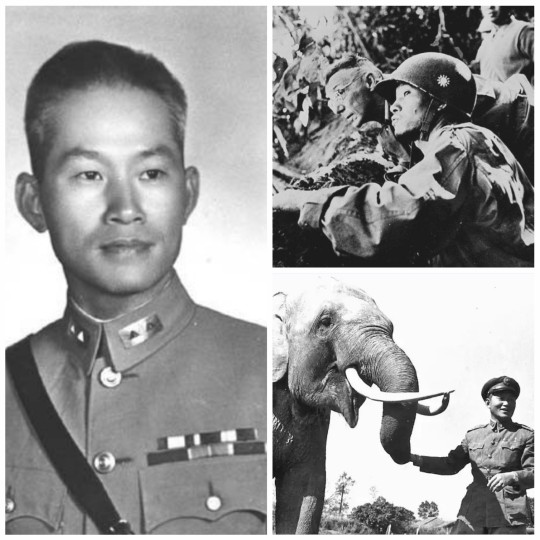
• Sun Li-jen
Sun Li-jen was a Chinese Nationalist general, a graduate of Virginia Military Institute, best known for his leadership in the Second Sino-Japanese War and the Chinese Civil War. His military achievements earned him the laudatory nickname "Rommel of the East".
Sun Li-jen was born on December 8th, 1900 in Jinnu, Lujiang, Chaohu, Anhui, with ancestry in Shucheng County. During the May Fourth Movement, he was part of the Scouts in the march at Tiananmen Square. In the same year (1919) he married Gong Xitao and was admitted in 1920 to Tsinghua University to study civil engineering. Sun played basketball at Tsinghua, becoming a star. He led the Chinese team to a gold medal at the 1921 Far Eastern Championship Games. With a Boxer Indemnity Scholarship, he transferred to Purdue University in the United States to complete his senior year in 1923, where he graduated in 1924. He briefly interned at Chicago Bridge & Iron Company in Chicago, Illinois. But patriotism motivated him to change career and pursue a military studies instead.
China was in the middle of a nationalist drive to unite the divided country and to protect the nation against imperialists. Sun decided that he could better serve his divided nation as a soldier rather than an engineer. He applied to the Virginia Military Institute. After graduating from VMI in 1927 Sun toured Europe and Japan to see the latest military organization and strategic thinking, then returned to China and became a corporal in the National Revolutionary Army and the Central Political Institute. He was then given command of the National Salt Gabelle Brigade, organized by Finance Minister T. V. Soong, which he made the best trained and equipped troops.
Sun led his troops fighting the Japanese during the Battle of Shanghai in 1937 and was badly wounded by mine fragments. After recovering, Sun returned to lead his troops at the front. After two years training, Sun's new 38th Division was sent by Chiang Kai-shek into Burma to protect the Burma Road under General Zhang Zhen, commander of the 66th Army, together with General Du Yuming (5th Army) and General Gan Lichu (6th Army) as part of the Chinese Expeditionary Force. Sun led one Chinese formation (38th Division) through difficult terrain to relieve 7,000 British forces trapped by the numerically superior Japanese in the Battle of Yenangyaung. His command included British artillery and 7th Armoured Brigade (United Kingdom) tanks temporarily placed under his command by General Willam Slim. Although unable to stop the Japanese from cutting the Burma Road, Sun gained the respect of General William Slim, the commander of the British 14th Army. Sun and his division retreated into India, while those of Du, against Sun's advice, retreated back into China and were badly mauled both by nature and by the Japanese. Early in 1943, after the successful retreat into India, Sun's division was incorporated in the New First Army, and became a part of 'X Force', the Chinese force under the command of Joseph Stilwell, the American commander of all American and Chinese troops in the "China Burma India Theater". The battle discipline of Sun's divisions reaffirmed Stilwell's respect for the Chinese soldier. His troops spearheaded the Burma Campaign, Stilwell's 1943 drive to reconquer North Burma and re-establish the land route to China by the Ledo Road. General Stilwell considered Sun the most capable Chinese field commander in the entire war.
In 1945, at the invitation of American General Dwight D. Eisenhower, Sun toured the battlefields of Europe. He returned to China to lead the New First Army to Canton to accept the Japanese surrender. The end of the war with Japan did not bring peace to China. Sun's New First Army was deployed to Manchuria, where the Soviet armies left the Communist forces in control of strategic areas and the Nationalists could find support only by enlisting local bandits and surrendered Japanese troops. On May 20th, 1946, Sun's troops defeated the People's Liberation Army to take a key railroad junction in the Battle of Siping, but only after a month of fighting. In July 1947, Sun was appointed the deputy commander-in-chief of the Army and commanding general of the Army Training Command. As the commander of the Army Training Command and deputy commander of the Republic of China Army in 1947, Sun moved one training facility to Taiwan, independent from the ongoing civil war. Sun trained new officers and troops for the Nationalist government, hoping to change the tide of the civil war. The effort was too little, too late in comparison with the massive numbers of troops defeated, but one of the divisions he trained (201 Division of the 80th Army) was sent to Quemoy to help crush off the communist invasion in 1949. In 1950, Sun was named Commander in Chief of the Republic of China Army, while also serving as commander of the Taiwan Defense Command and of the Army Training Command. Sun was well respected by the Americans, and rumors that the CIA sought a coup to replace Chiang Kai-shek with Sun made Chiang and his son Chiang Ching-kuo eager to remove him from power. Sun was reassigned as the ceremonial chief military adviser to Chiang Kai-shek in June 1954, preventing him from directly controlling any troops. On August 20th, 1955 Sun was officially relieved from his duties and put under house arrest. A nine-person committee under Vice-President Chen Cheng was set up to investigate General Sun's involvement in the alleged spy case. The CIA also allegedly wanted to help Sun take control of Taiwan and declare its independence.
More than 300 of Sun's close subordinates were placed under arrest and many more were relieved of their duties. Sun remained under house arrest for more than three decades: he was not released until March 20th, 1988, shortly after the death of Chiang Ching-kuo. He died in his Taichung home at the age of 89 on November 19th, 1990. In 2001, Sun's reputation was cleared after a government investigation into the purported coup attempt. In January 2011, President Ma Ying-jeou formally apologized to Sun Li-jen's family and Sun's house in Taichung was opened as a memorial hall and museum.
#second world war#world war ii#military history#history#chinese history#world war 2#nationalist china#second sino japanese war#biography#wwii#american history#short post
77 notes
·
View notes
Link
India’s government said on Tuesday that it would prioritize taking in Hindus and Sikhs from Afghanistan — a move that drew comparisons to a contentious 2019 citizenship law, enacted under Prime Minister Narendra Modi, that discriminates against Muslims. The country’s home ministry said it would introduce “emergency visas” to allow Afghans to stay in India for six months. It did not say whether Muslims, who make up the majority of those seeking to leave Afghanistan as the Taliban take over, would also be considered. “We are in constant touch with the Sikh and Hindu community leaders in Kabul,” S. Jaishankar, India’s external affairs minister, said on Twitter. “Their welfare will get our priority attention.” That distinction prompted condemnation from some corners. “Ashamed that the government of India response now is to look at desperate Afghan refugees not as humans fleeing persecution and sure death, but from the view of whether or not they’re Muslim,” Kavita Krishnan, an opposition politician, said on Twitter. India also drew criticism after numerous seats were left empty on an Air Force flight on Tuesday that evacuated Indian citizens and officials from the country’s embassy in Kabul. Officials in New Delhi have indicated that the country will “stand by” the Afghans who worked closely with the Indian government and its mission in Afghanistan. It is not clear whether their religious status would be a factor in that process. A spokesman for the ministry of external affairs did not immediately respond to a request for comment. India has previously granted visas of a longer duration to Afghans fleeing persecution, irrespective of their religion. Many Afghans migrated to India when the Taliban took over about two decades ago. Some have settled in New Delhi, where a shopping district popularly named “Little Kabul” comes alive every evening with stalls selling traditional food. U.S. and Afghan officials say that India’s archrival, Pakistan, has permitted free movement to Taliban leaders, and that the country continues to serve as a haven where fighters and their families can receive medical care. But experts say that India is cautiously navigating its relationship with Afghanistan’s new leaders. Indian diplomats recently made efforts to engage with the Taliban as part of the U.S.-led talks in Doha, Qatar. Some in India have urged their government to engage directly with the Taliban. Vivek Katju, a former Indian ambassador to Afghanistan, told The Wire news outlet last week that the country had become a “bystander” in Afghanistan and that India’s leaders did not know “which way to turn” anymore. “Engagement with the Taliban should happen,” Mr. Katju said in a telephone interview with The New York Times on Tuesday. “The mechanics of the engagement should be such that it should be open and direct.” For its part, Pakistan’s leadership has stopped short of hailing the Taliban’s takeover of Afghanistan. “When you adopt someone’s culture, you believe it to be superior and you end up becoming a slave to it,” Prime Minister Imran Khan said on Monday in a veiled reference to the United States and Western culture. “In Afghanistan, they have broken the shackles of slavery,” Mr. Khan said at an appearance in Islamabad, “but the slavery of the mind does not break away.”
3 notes
·
View notes
Text
DAY 4309
Jalsa, Mumbai Dec 23/24/ 2019 Mon/Tue 12:53 AM
Birthday - EF Irfan Nuyani .. Anu Uttam .. Tuesday, December 24 .. our love and greetings to Irfan and Anu on this special day .. wishes from the entire Ef family ..
The fragrance of return .. the ‘nargis’ in the favourites .. the display over visible locations within the home .. an order restored .. disciplined overtures .. the Home Lady is back ..

... the neck the ham string the lower back the wrists decomposed .. seated long distressed .. the fever condition .. the advice of the medical for rest and recoup and no travel .. the missing National Award .. a certain discovery of the cinematic unseen .. and the physio unabated ..
.. days and time do pass in comparison to the ‘left for work’ information in some regularity .. different .. but so it is ..
.. a mass of communication to acknowledge the birthday and the Award, takes ink .. good to be able to swipe the pen, than the black buttons .. keeps the writing hand in practice , though the signs of scripting misadventures do occur .. we are now in the realm of that which has and have immediate answers and solutions to the unknown .. for the moment ... in time perhaps or so they say the mere thinking of it could produce the required result ..
.. think and be done ..
.. so back to the medical .. the ham string injury hinders the walk and the sitting .. long hours of which need respite .. so to the standing table be lured .. not now .. the fever constraints prevail .. but the positioning has been done, when the fever reduces .. ..
The visit to Poland has been one of the most memorable .. and in particular the stay at Wroclaw, the UNESCO recognised city for its many facetted culture and status .. literature being most prominent ..
The ‘gnome’ of my Father now established into the cemented earth of the main Square .. the Mayor of the City in its inauguration and its credentials spoken ..
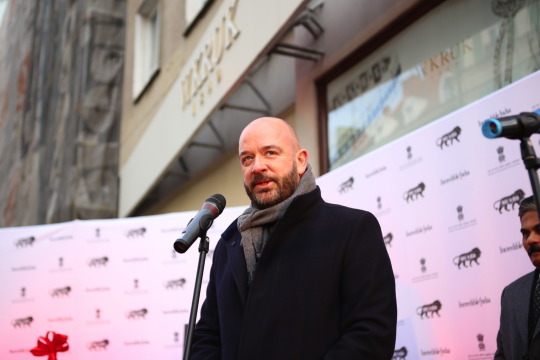
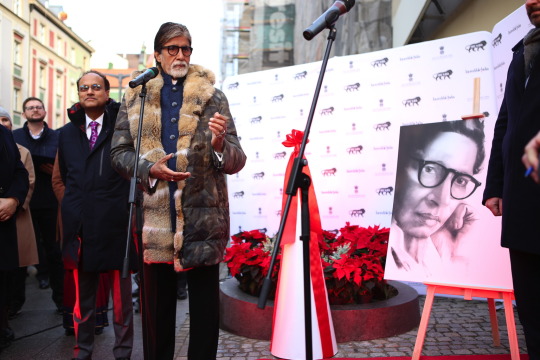
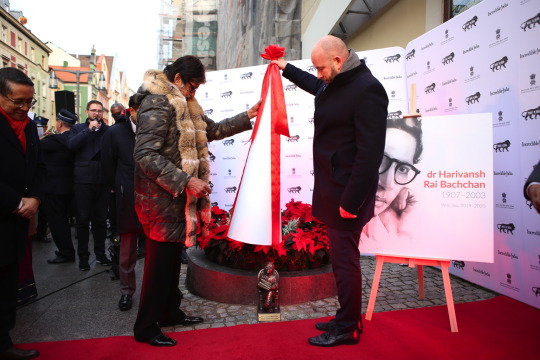

.. this is the treasure and the tradition of the City .. the City of Gnomes or the dwarfs .. the bust is cemented deep into the paving in permanence, as are other prominent gnomes of other personalities ..

.. the ceremony at the University of Wroclaw, a 300 year institution, where respect and honour is given to Babuji .. in the Hall of celebration ..

.. and young Polish girls from a music Institute perform on stage the Indian National Anthem .. and then sing .. “Madhushala” verses in Hindi .. absolutely amazing ..
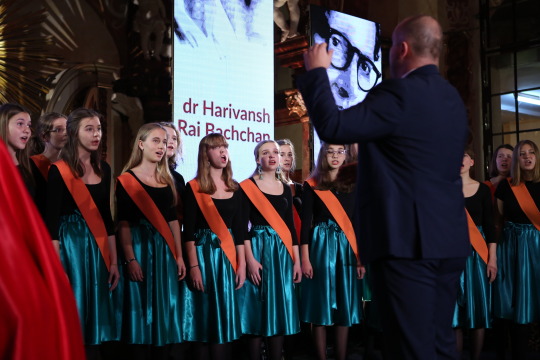

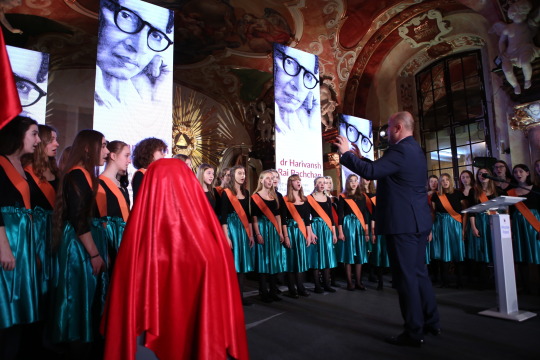
.. the City releases a postage stamp in honour of Babuji ..

.. the sculpted bust of Babuji a special honour in design by one of their prominent artists ..
.. and then the Governor from Ministry Of Culture and National Heritage , along with the order from the Prime Minister, present to me the Medal of ‘Meritorious of Polish Culture’ .. a most humbling moment ..
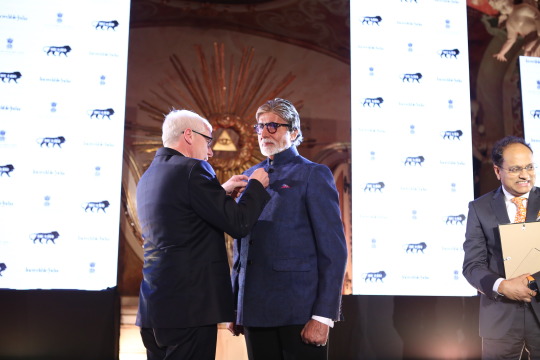
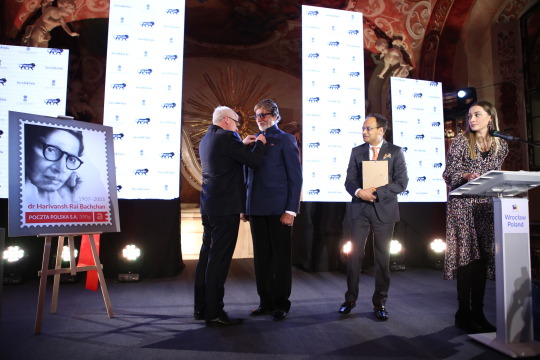

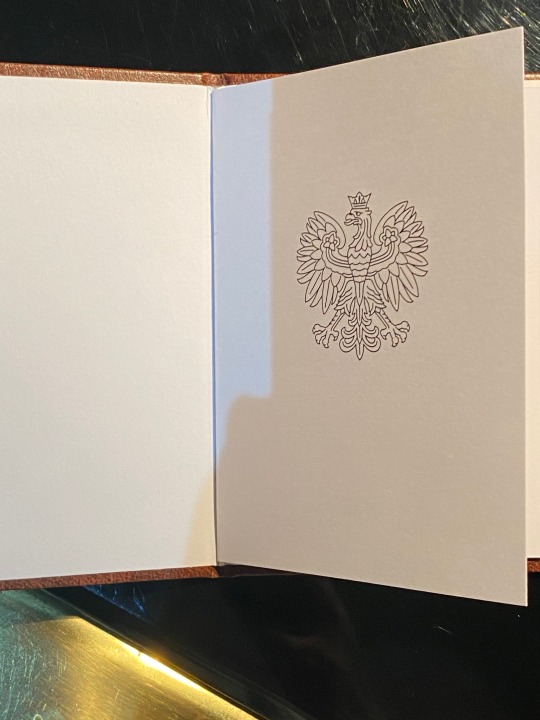
.. and then the Medal form the University from the Rector ..
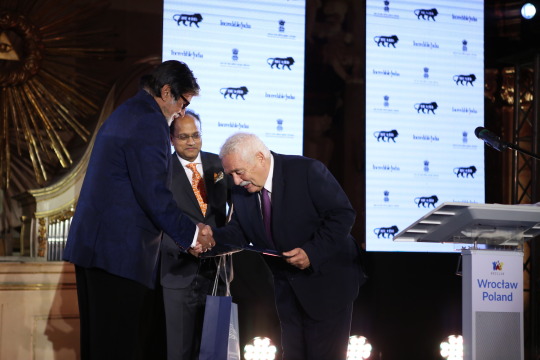
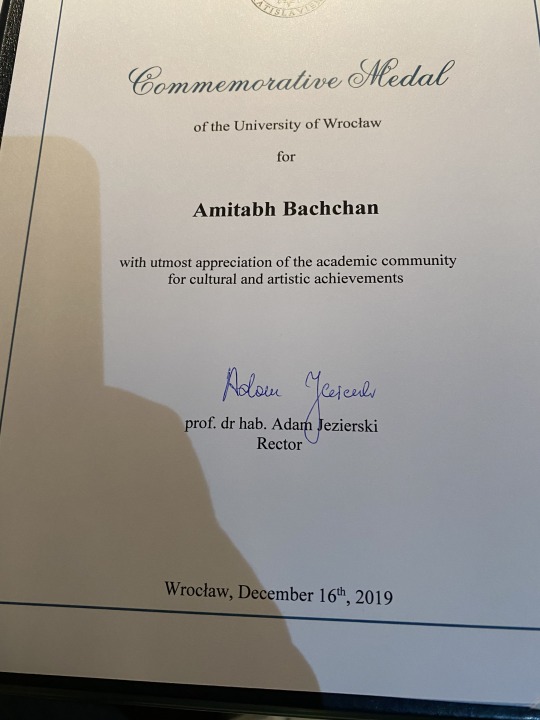
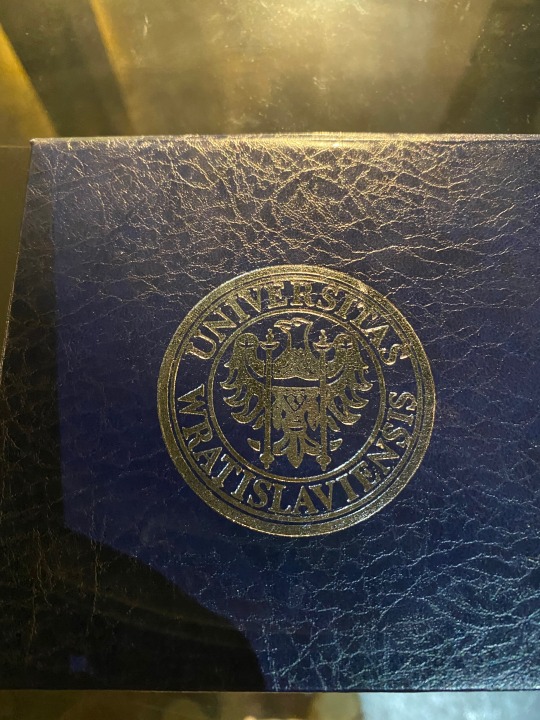

.. and finally a commendation from the Bishop from the Church of Peace where they held a special prayer as mentioned in an earlier Blog ..

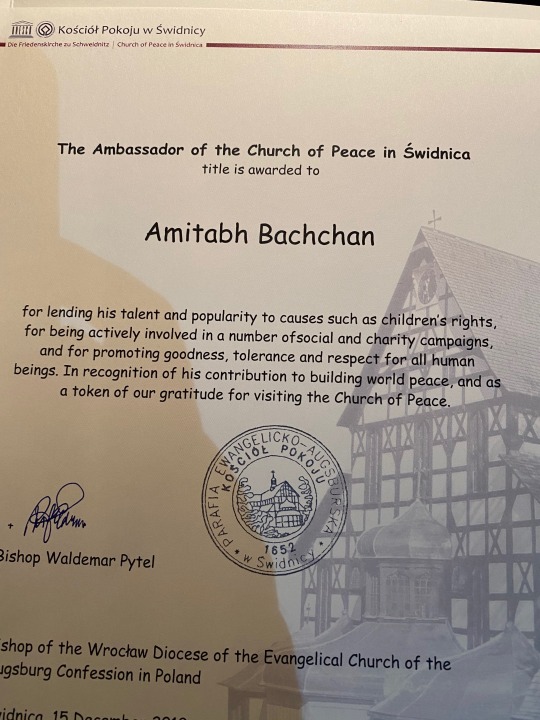
.. these moments shall ever remain etched in my heart forever .. the affection and the grace from Wroclaw and its people has been unbelievable .. never before ..
.. but then the final announcement , from the Mayor at the event for Christmas carol singing, where words of Babuji poems were also included in the songs ..


... the Mayor announces that he has made me the Honorary Ambassador of the City of Wroclaw, Poland .. an incredible honour not just for me but the entire Film Fraternity of India and indeed the Country .. this in the presence of the Ambassador of India in Poland and the Consul General , Indii ..
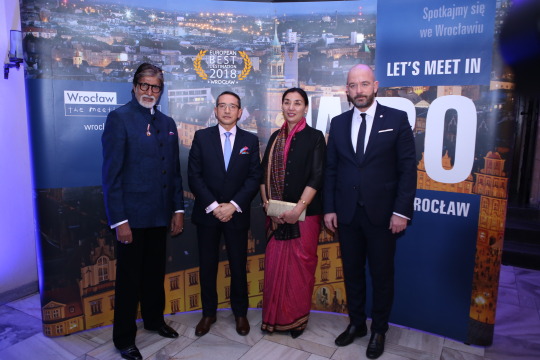
But pictures do not express entirely the immense emotional connect with the people of the City their hospitality and their love .. I can never forget these few memorable days spent and have the desire to be in the midst of the people of Wroclaw again ..
Soon after the announcements , the Mayor played a little game with me , informing me of the tradition during Christmas of searching for their gifts under the tree .. and this is what followed ..



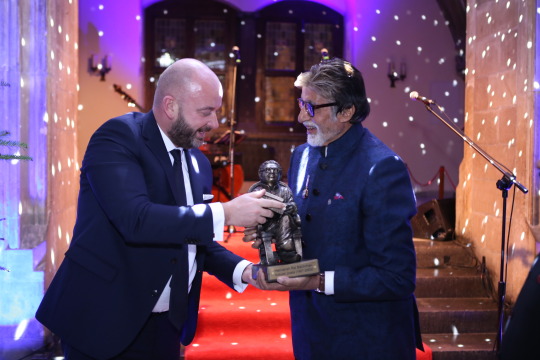


.. the gift was the replica of the ‘gnome’ of Babuji that has been cemented in the main square .. and which I have brought back with me to be placed in Babuji’s study in Prateeksha ..
Some time in the days to come there shall be an attempt to post some videos of the events , and to show how generously each moment was planned and executed with the discipline and finesse that the occasion demanded ..
From a literary point of view .. the most important meet of course was with the Nobel Laurette in Literature for this year given to Poland for the very first time to Ms Olga Tokarczuk .. she presented to me her novel of stories translated into Hindi .. and I presented her with the special edition of Madhushala brought out by us on his 100th Anniversary ..
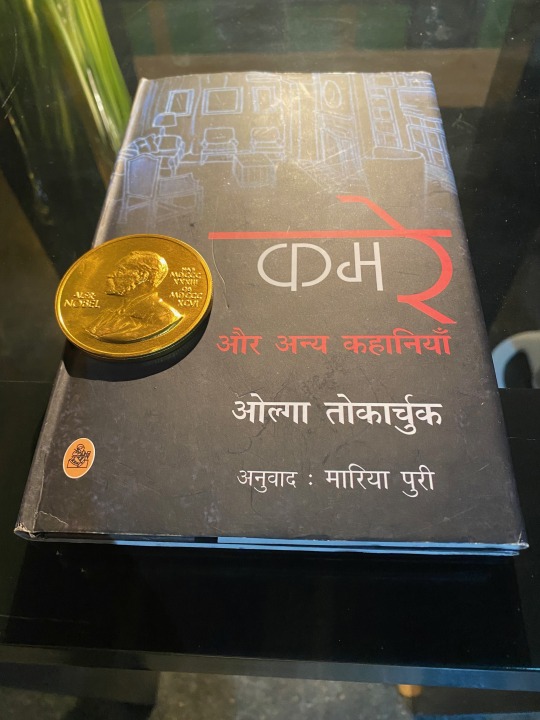
.. one endeavours to keep most of this to oneself and within the family .. but insistence to put it out was severe .. documentation has become the yardstick of information .. nothing else is either believed or recognised in today’s times .. so help me God .. !!! .. what is believed and recognised has varied connotations too .. it be the grammar and verbal democracy of the language .. of any language .. a word an instance , and the manic genius of the ‘sophisticated rhetorician, intoxicated by the exuberance of his or her own verbosity’ shall take over and run prime ..
.. be not therefore in the vicinity of its value dear Ef .. for such extenuating circumstances shall ever coerce me to preclude you from such a bauble of extravagance !
The time line at the bar above gives me Tue 3:08 AM .. it be time to retire ..
.. may the verbosity of the intoxicated take over and be in exuberance .. 🤣
समझ ने वाले समझ गए हैं ; जो ना समझे वो अनाड़ी है !!😜🤣
नमसकार 🙏

अमिताभ बच्चन
247 notes
·
View notes
Note
can you go into any detail about why never have i ever isn't good? i really wanted to watch it, but if it's trash i don't wanna bother. thank you!!
alright I sat on this for a few hours so I could finish the rest of the show and write this in the morning and now it is morning. also there are going to be quite a few spoilers in here so just...do what you will with that knowledge i guess. also, if you still want to watch the show, I’m not gonna stop you. I binged the entire season yesterday and I have final exams next week. warning: this is super long.
ngl I was planning on just deleting the post you’re referring to, because at that point I had only watched half the season but I already saw a lot of things I didn't like: an Indian character who seemed a little ashamed of her heritage, too many pr*yanka ch*pra references, some strange and unnecessary ableism (i mean, all ableism is unnecessary but this particularly so), bad stereotypical Indian accents, the main character thirsting over white/white passing boys (this is Mindy's show, can you expect anything different?), and a disgusting amount of fatphobia (there is one fat character who is Devi’s age and his only personality traits are eating and making a fool of himself).
the show also conflates indian and hindu a few too many times, even though there is a self-aware quip about it. and there’s a joke thrown in about m*di that *i guess* is supposed to show that this family at the least knows who the prime minister of india is? but with india’s current political situation and the knowledge of the atrocities committed by m*di I really did not like that a reference to him was thrown in there. I suppose it is an example of how the desi diaspora (particularly upper-caste, upper middle class Indians) are quite disconnected from the homeland, but like...does Mindy not watch the news? m*di literally committed genocide.
there’s also a lot of antisemitism. Devi’s academic rival, Ben, is introduced like a walking Jewish stereotype: just check out this post because op says it better than I could. there’s also a joke where Devi says out loud that she wishes Ben was killed by N*zis. I honestly don’t even know how that made it into the show and none of the context surrounding the joke is funny.
okay on to my personal qualms with the show. I wasn’t a fan of either of the love interests. neither of them really respected Devi as much as I would have liked, and personally, I found it tiring to see women/girls of color chase after men/boys who can’t reciprocate in the same way. I didn’t love how paxton (the cool jock love interest) kept leading Devi on and would then act aloof and I honestly would have preferred if Devi and ben hadn’t kissed, because I just prefer their frenemy dynamic over some potential romantic one. i also just could not relate to Devi at all...I was just too repressed in high school to relate to anything Devi does. she’s also just super unlikeable in the first eight episodes, but she kind of grew on me in the last two. I saw a comparison made between Devi coping with her grief with hypersexuality and the coping mechanisms used by the main character on Fleabag, which kind of made sense to me, even though they are pretty different shows otherwise. and she does get some comeuppance for her actions towards the end. even then, devi never really confronts her trauma directly, especially her paralysis, and her actions are excused too many times for comfort.
a lot of the storyline depended on teen romcom cliches, and were sort of excused because the main characters are poc. i wish this trend didn’t happen so often, especially when it comes to mainstream stories of young women and girls of color. i was also surprised that this show doesn’t really give much screentime to other indian kids that Devi might interact with. that would have been a much more three-dimensional approach to a show like this, but i also think this had to be sacrificed to keep up with the teen romcom aspect of the show. i was also not a fan of the will-schuester-wannabe history teacher.
BUT (if you have been reading this much I sincerely applaud you) there were a few things I did like about the show. I loved Devi’s friends and honestly if I had her friends in tenth grade I would never ditch them for some boy. when I was a high school sophomore, I was closeted, had a musical theatre obsession, and ate dosas for dinner so I felt like a mix of all three of the girls. in fact, I found eleanor’s and fabiola’s storyline to be a lot more compelling that Devi’s at times. i even really enjoyed ben’s arc (and loved the andy samberg narration in his episode, especially because he pronounced Devi’s name with the soft “dh” sound...absolutely wonderful!). i thought fabiola’s coming-out scene was sweet (even though it was very textbook) and i thought eleanor being dramatic was very funny.
in my opinion, the last two episodes were the best. we really got to dig deeper into Devi’s relationship with her mother and it was eerily reminiscent of my own. she gets told that she has to move to india because family is there, so she naturally fights with her mom and storms off. that literally happened to me (minus the running away part...I actually did end up moving to India in the middle of high school), and other moments like those just hit close to home and made me want to finish the show. i personally didn’t relate to the whole “am I indian or not Indian enough” struggle until I started living in india, but my indian friends who did go to high school in america were all too sympathetic to this struggle.
so overall, there are some bad things and some good things about this show. if you relate to the premise of the show at all, you may like it more than I did, but if you were raised in india (which is the demographic that most of the criticism is coming from) or generally enjoy good writing, you probably won’t like this as much. i do hope that this show helps pave the way for some representation that brings more nuance to indian-american identity, and different types of indian-american identities (working-class, immigrants who aren’t upper-caste, people who have been living in the states for several generations, LGBT people, indian muslims/christians/sikhs/etc) without unnecessarily bringing down other minorities. and once again, i am really happy that a girl named maitreyi ramakrishnan is getting famous and NOT anglicizing her name.
i hope this response was good and if you do decide to watch, let me know how you like it!
#anonymous#asks#never have i ever#jfc this became really long i hope someone is jobless enough to read it#i spent an embarrassing amount of time on this essay#medhini loves to ramble#I also think I missed a couple of things so don't hate me
42 notes
·
View notes
Text
Saturday, May 1, 2021
Student loan debts (WSJ) U.S. taxpayers could ultimately be on the hook for roughly a third of the $1.6 trillion federal student loan portfolio. This could amount to more than $500 billion, exceeding what taxpayers lost on the saving-and-loan crisis 30 years ago. While defaulted student loans can’t cause the federal government to go bankrupt the way bad mortgage lending upended banks during the financial crisis, they expose a similar problem: Billions of dollars lent based on flawed assumptions about whether the money can be repaid.
Costa Rica to close non-essential businesses next week over COVID-19 (Reuters) Costa Rica will for the next week close non-essential businesses, including restaurants and bars, across the center of the country due to a sharp increase in new cases of COVID-19 and hospitalizations, the government said on Thursday. From May 3-9, restaurants, bars, department stores, beauty salons, gyms and churches must close in 45 municipalities in central Costa Rica, where almost half the population lives and over two-thirds of new cases have been registered. The government will also impose travel restrictions during the week.
After a Year of Loss, South America Suffers Worst Death Tolls Yet (NYT) In the capital of Colombia, Bogotá, the mayor is warning residents to brace for “the worst two weeks of our lives.” Uruguay, once lauded as a model for keeping the coronavirus under control, now has one of the highest death rates in the world, while the grim daily tallies of the dead have hit records in Argentina, Brazil, Colombia and Peru in recent days. Even Venezuela, where the authoritarian government is notorious for hiding health statistics and any suggestion of disarray, says that coronavirus deaths are up 86 percent since January. As vaccinations mount in some of the world’s wealthiest countries and people cautiously envision life after the pandemic, the crisis in Latin America—and in South America in particular—is taking an alarming turn for the worse, potentially threatening the progress made well beyond its borders. Last week, Latin America accounted for 35 percent of all coronavirus deaths in the world, despite having just 8 percent of the global population, according to data compiled by The New York Times.
France Proposes More Surveillance to Hunt for Potential Terrorists (NYT) The French government, responding to several attacks over the past seven months, presented a new anti-terrorism bill on Wednesday that would allow intense algorithmic surveillance of phone and internet communications and tighten restrictions on convicted terrorists emerging from prison. “There have been nine attacks in a row that we could not detect through current means,” Gérald Darmanin, the interior minister, told France Inter radio. “We continue to be blind, doing surveillance on normal phone lines that nobody uses any longer.” The draft bill, prepared by Mr. Darmanin, came in a political and social climate envenomed by Marine Le Pen, the far-right leader, who applauded a letter published this month by 20 retired generals that described France as being in a state of “disintegration” and warned of a possible coup in thinly veiled terms. Published in a right-wing magazine, Valeurs Actuelles, the generals’ letter portrayed a country ravaged by violence, swept by hatred and prey to subversive ideologies bent on stirring a racial war. “If nothing is done,” they said, “laxity will spread inexorably across society, provoking in the end an explosion and the intervention of our active-service comrades in the perilous protection of our civilization’s values.”
Toll of Afghan ‘forever war’ (AP) After 20 years, America is ending its “forever war” in Afghanistan. Announcing a firm withdrawal deadline, President Joe Biden cut through the long debate, even within the U.S. military, over whether the time was right. Starting Saturday, the last remaining 2,500 to 3,500 American troops will begin leaving, to be fully out by Sept. 11 at the latest. Another debate will likely go on far longer: Was it worth it? Since 2001, tens of thousands of Afghans and 2,442 American soldiers have been killed, millions of Afghans driven from their homes, and billions of dollars spent on war and reconstruction. The U.S. and NATO leave behind an Afghanistan that is at least half run directly or indirectly by the Taliban—despite billions poured into training and arming Afghan forces to fight them. Riddled with corruption and tied to regional warlords, the U.S.-backed government is widely distrusted by many Afghans.
In India’s devastating coronavirus surge, anger at Modi grows (Washington Post) As he surveyed the thousands of people gathered at an election rally in eastern India on April 17, Prime Minister Narendra Modi appeared jubilant. “Everywhere I look, as far as I can see, there are crowds,” he said, his arms spread wide. “You have done an extraordinary thing.” At the time, India was recording more than 200,000 coronavirus cases a day. In the western state of Maharashtra, oxygen was running short, and people were dying at home because of a shortage of hospital beds. In Modi’s home state of Gujarat, crematoriums were being overwhelmed by the dead. For Modi, the most powerful Indian prime minister in five decades, it is a moment of reckoning. He is facing what appears to be the country’s biggest crisis since independence. Modi’s own lapses and missteps are an increasing source of anger. As coronavirus cases skyrocketed, Modi continued to hold huge election rallies and declined to cancel a Hindu religious festival that drew millions to the banks of the Ganges River. Modi swept to a landslide reelection victory in 2019, offering Indians a muscular brand of nationalism that views India as a fundamentally Hindu country rather than the secular republic envisioned by its founders. He has cultivated an image as a singular leader capable of bold decisions to protect and transform the country. Now that image is “in tatters,” said Vinay Sitapati, a political scientist at Ashoka University in the northern Indian state of Haryana. Modi and his governing Bharatiya Janata Party (BJP) built a formidable machine for winning elections, Sitapati said, but their mind-set of continuous campaigning has come “at the cost of governance.”
Iran and Saudi Arabia Edge Toward Détente (Foreign Policy) Iran’s relationship with Saudi Arabia could be entering “a new chapter of interaction and cooperation,” Iranian foreign ministry spokesman Saeed Khatibzadeh said on Thursday, as the two countries signal a rapid mending of diplomatic ties. Khatibzadeh’s comments came in response to an interview Saudi Crown Prince Mohammed bin Salman gave to state television this week, when he said that problems between the regional rivals could be overcome and “good relations” could soon prevail. His recent comments offer a stark contrast with ones he made in 2018 when he compared Iran’s Supreme Leader Ayatollah Ali Khamenei to Adolf Hitler and described Iran as part of a “triangle of evil.” Behind the scenes, the two countries have also been busy. Earlier this month, the Financial Times broke news of direct talks, held in Baghdad, with a primary focus on ending the war in Yemen.
Chloe Zhao's challenge to Chinese Beauty standards (Quartz) Although Chloé Zhao’s Oscars win has largely been censored in China, her chill, no-makeup look at the awards ceremony has become a hit among many Chinese women, who say Zhao made them feel they can also ditch cosmetics and stop appealing to mainstream beauty standards in the country. China has a set of rigid standards for women’s appearance, prompting online slimming challenges that encourage young girls to pursue body shapes that allow them to wear children’s clothes, or have waists with a width similar to the shorter side of a piece of A4 paper (around 21 cm). As such, Zhao’s no-makeup look is a much-needed endorsement for women in China, where few public figures dare to break away from traditional beauty requirements.
Hong Kong’s latest star TV host? City leader Carrie Lam. (Washington Post) In a city known for producing action-packed martial arts movies, there’s a gripping new TV show on the block. The title promises to captivate viewers: “Get to Know the Election Committee Subsectors.” The star? Hong Kong Chief Executive Carrie Lam, not as a guest but as the host. The show, which premiered Wednesday on public broadcaster Radio Television Hong Kong, gives Lam a platform to promote electoral changes introduced by Beijing that further tilt the system against pro-democracy voices, add weight to industry-sector representatives and ensure only “patriots” loyal to the Communist Party can govern Hong Kong. People in mainland China have long been accustomed to state propaganda broadcasts. Hong Kong, however, traditionally had a freewheeling media environment. But almost a year after China imposed a security law that curtailed freedom of speech there, the public broadcaster has become a vital instrument of Beijing’s efforts to control the narrative. Wednesday night’s double-episode premiere featured furious agreement on the merit of Beijing’s electoral changes. The episodes scored only a few thousand views and mostly “thumbs-down” responses on YouTube. One user drew comparisons to George Orwell’s “1984.” If you missed the show, there’s plenty of opportunity to catch it again; episodes will air four times a day, every day.
Cambodians complain of lockdown hunger as outbreak takes toll on poor (Reuters) Residents in Cambodia’s capital gathered on Friday to demand food from the government, outraged at what they called inadequate aid distribution during a tough COVID-19 lockdown that bars people from leaving their homes. Authorities put Phnom Penh and a nearby town under a hard lockdown on April 19 to quell a surge in coronavirus infections that has seen Cambodia’s case total balloon from about 500 to 12,641 since late February, including all 91 of its deaths. Though private food deliveries are operating, markets and street food services are closed, making it difficult for poorer families to get supplies, with many without income because of the stay-home order. Amnesty International on Friday called Cambodia’s lockdown an emerging humanitarian and human rights crisis, with nearly 294,000 people in Phnom Penh at risk of going hungry.
Palestinian election delay (Reuters) It could have marked a political turning point. Palestinians were slated to go to the polls starting next month for the first time in 15 years—but on Thursday, Palestinian Authority President Mahmoud Abbas announced he will indefinitely postpone the elections. He blamed Israel, accusing authorities of stonewalling efforts to let Palestinian residents of East Jerusalem cast their ballots. But Israeli officials suggested Abbas was using Israel as a pretext to cancel a vote his faction might lose. Hamas, his party’s rival, has rejected the move, and some Palestinians took to the streets to protest.
The real threat to Chad’s military rulers: unemployed youth (Reuters) When Neldjibaye Madjissem graduated with a mathematics degree in 2015, he began searching for work as a school teacher. Six years on, he is still looking—and is angry. The 31-year-old blames Chad's government for lack of work, mismanagement of oil revenues and corruption. No wonder people are protesting on the streets in their thousands, he says. The battlefield death of President Idriss Deby last week, after 30 years of autocratic rule, sent the Central African country into a tailspin. But perhaps the greater threat for Chad’s rulers comes from the mass of unemployed young people tired of the Deby family and its international allies, particularly former colonial ruler France. At least six people died in violent protests this week. "The lack of jobs risks creating a great problem. The people are angry," said Madjissem, as he prepared a private lesson to a high school student in the living room of a tiny house in N'Djamena. His infrequent wage: $3 an hour.
Famine looms in southern Madagascar, U.N.’s food agency says (Reuters) Famine is looming in southern Madagascar, where children are “starving” after drought and sandstorms ruined harvests, the U.N.’s World Food Programme (WFP) said on Friday. Amer Daoudi, senior director of WFP operations globally, speaking from Antananarivo, Madagascar, said he had visited villages where people had resorted to eating locusts and leaves. “I witnessed horrific images of starving children, malnourished, and not only the children—mothers, parents and the populations in villages we visited,” Daoudi told a United Nations briefing in Geneva. Malnutrition has almost doubled to 16% from 9% in March 2020 following five consecutive years of drought, exacerbated this year by sandstorms and late rains, he said.
1 note
·
View note
Text
Best Digital Marketing Career in India
What Is Digital Marketing?
Digital advertising is the detail of advertising that makes use of the net, social media, seek engines, and different channels to attain clients. Some Advertising specialists in Chennai study virtual advertising to be a totally new try that desires a brand new manner of attaining clients and a brand new course of information how clients behave in comparison to standard advertising.
The law of advertising has converted due to the fact Digital Marketing in India have become an eminent approach of setting services and products to buyers. Come to think about it, it's been one of the fewer profession selections which have lived as much as the promoting it has discovered. Increased pay, customers husking out extra revenues, and numerous operating profiles are a number of the endless advantages of a virtual advertising profession in India.
Classifying eight extra motives under so as to be seeking this profitable profession.
High Demand
Digital marketing call for has amplified uniformly over the previous few years. Based at the report, India has above 460 million net customers and numbers are increasing, with each passing significance. The top minister’s Digital India Campaign has best uplifted its awareness.
Short-variety education publications
Various Digital Marketing Services Chennai are offering short-variety virtual advertising publications that allow you to pursue a profession in the one you love operating profile. In latest times, faculties have begun out organizing virtual advertising as a specialization of their Undergraduate publications.
Skill-Driven Industry
The area is in determined want of revolutionary operating specialists who're properly at what they do. It may be anything. search engine marketing paintings, Copywriting, Website designing, and UI designing; take your pick. The enterprise is massive and desires skillful specialists.
Growing Market
Brands, with the cause to promote their products, are looking for heart-warming campaigns other than a super internet site and energetic social handles. Various groups are utilizing the equal social media influencer for more than one products.
Formerly, one influencer was once chipped for one emblem best. No longer. They extrude manufacturers in approximately a month, now. That is how dynamic, versatile, and speedy the marketplace has become.
Attractive Salary
Companies are equipped to pay properly purpose there's a massive call for and now no longer a lot supply. Because there may be not anything extra superior than operating what you like and incomes a great earnings in go back too. The SEO Expert in India started out operating in virtual advertising 3-four years in the past are incomes a slew of cash today.
Creative Freedom
You get numerous possibilities to position at the back of your thoughts and if they're super enough, they undergo too. You can decide the man or woman of a campaign, imaginative or a great innovative reproduction contingent upon the man or woman of your profile. If you need a sense of freedom whilst operating, virtual advertising is the manner to go.
Work with Ad groups
An Digital Marketing Expert Chennai corporation works with numerous customers. Education Leaders, Restaurant, Real property builders, Automobile Brands, and the listing won’t end. There are a bunch of task profiles that fall into the virtual advertising area. A small variety of profiles for which you may paintings on are:
· Content Marketing Manager
· Content Writer
· Digital Brand Manager
· Digital Marketing Manager
· search engine marketing Analyst
· Account Manager
· Graphic / UX designer
Great paintings-lifestyles balance
Digital Marketing Consultant in Chennai thoughts having a sit back operating environment. It additionally has loads to do with the form of paintings they do i.e. Innovative and funny. You can favor to paintings for the same corporation or you may be your personal boss, freelancing and operating on initiatives from home.
#digital marketing company Chennai#Digital Marketing Singapore#Digital marketing in Chennai#digital marketing agency singapore#digital marketing services Singapore
1 note
·
View note